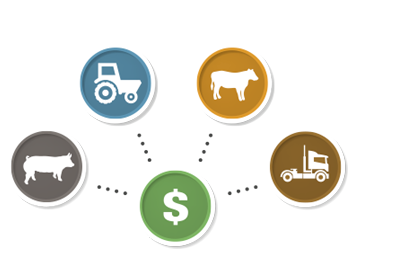
Crop Insurance Explained
Crop insurance is an important risk management tool that protects farmers and ranchers against unexpected yield or revenue losses due to changing weather or market conditions.
6 Minute ReadWe teamed up with Farm Journal to ask experienced farmers to share their best advice with young and beginning producers. The result is Practical Wisdom – the sharing of knowledge from one generation to the next.

Many young farmers and ranchers have more time and energy than money when starting their operations. Experienced farmers offer suggestions on how to turn those attributes into long-term assets.
“Provide service/labor to older farmers or landlords,” suggested Karen Havens, who farms in Iowa. “They are often willing to pay for labor because they are not able to do it themselves, or by themselves, anymore.”
“Add a livestock enterprise,” advised Max R. Sullivan, an Indiana farmer. “Do part-time, off-farm work like trucking, custom machine operation, custom spraying or seed sales. But the best way is for your spouse to get a high-paying off-farm job with good benefits.”
Off-farm work is valuable not only for the income it delivers, “but it also helps you to interact and stay connected to others for many purposes,” wrote Greg, who farms in Illinois.
“If a producer has some form of non-farm income that can cover the majority of family living expenses and health insurance, that can take a lot of pressure off of the farm,” said Josh Rife, a financial officer for Farm Credit Services of America (FCSAmerica) in Aberdeen, South Dakota. “It can potentially save a young or beginning producer from being forced to make major changes during market adjustments.”
Diversification is valuable, too, and opportunities vary from region to region.
“We have the opportunity to diversify by raising white corn,” wrote Mike Schardt, a Nebraska farmer. “Since we are a heavily irrigated area, some guys start their own pivot repair business. The key is to look around and fill an unmet need. Be an honest and trustworthy businessman/woman, work hard and you will make it.”
“Be an honest and trustworthy businessman/woman, work hard and you will make it.”
– Mike Schardt, a Nebraska farmer
Fellow Nebraskan Tom Andrews suggested adding livestock to the operation. “Raise a pig and get an income three months later. Raise a calf and wait a year to get the turnaround. These opportunities will change for every individual.
Fellow Nebraskan Tom Andrews suggested adding livestock to the operation. “Raise a pig and get an income three months later. Raise a calf and wait a year to get the turnaround. These opportunities will change for every individual.
“Search for opportunities to economize wherever you can,” Andrews added. “When I bought my first cow herd, I calved in the fall. One neighbor, who calved in the spring, let me borrow his bulls in the winter to breed my herd when he didn't need them.”
Several experienced producers suggested working with family, friends or neighbors to share use of equipment they otherwise couldn’t afford.
“Young producers learn the new technology as soon as they can,” wrote David, who farms in Washington state. “They cannot necessarily afford the new tech, but if they shop around, there normally is someone out there willing to lend a hand by making it available in a very affordable manner. I am surprised at how innovative these young farmers are at getting this new technology to use without having to pay top value and often not even paying to own it, just use it.”
FCSAmerica’s Rife said he’s observed younger operators’ technology skills come into play.
“I’ve seen young and beginning producers retrofit 30-year-old tractors and sprayers with the latest auto-steer and auto-shut off technology,” Rife explained. “If you are able to retrofit older equipment you can realize significant savings and still have the use of the latest technology.”
Being open about goals and considerate of others also pays long-term dividends to young operators, Rife said.
“A lot of young producers assume the neighbors know they want to expand their operations, but this may not be the case,” Rife noted. “It’s always helpful to let the neighbors know, in a respectful way, that you’d love to rent their ground if the opportunity comes about. It also helps to authentically reach out to help neighbors in need. Being a good neighbor can lead to a lot of unexpected opportunities.”
Categories: Education,

Crop insurance is an important risk management tool that protects farmers and ranchers against unexpected yield or revenue losses due to changing weather or market conditions.
6 Minute Read
When considering financing options for land, equipment and other farm purchases, two common types of loans you may come across include term loans and operating loans – also known as an operating line of credit.
5 minute read
Loans and lines of credit are two different financing options borrowers can leverage to help manage working capital while maintaining adequate cash on hand.
4 minute read